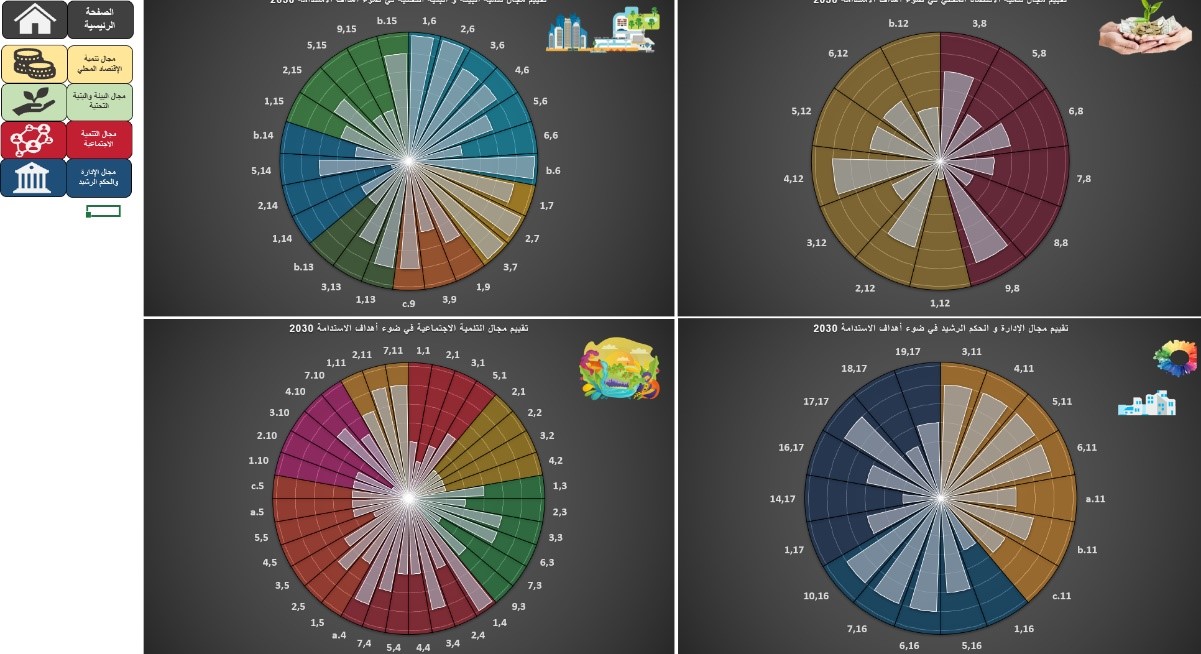Aligning Local Development Plans to the SDGs

© Photo „Nablus at 7am“ by rpb1001 via CC BY-NC 2.0 via Flickr
In Palestine, three cities put their local planning tools to the test and accessed them in consideration of the SDGs. They adapted the City WORKS approach and tools to make them more responsive to their needs and context. In Palestine, urban areas are already home to 75 percent of the population and they continue to expand rapidly. This poses challenges regarding land availability, fragmented urban development and a diffused urban sprawl. Moreover, Palestinian cities face various social, economic and political obstacles. Effective urban planning can positively affect the situation of conflict in building inclusive, diverse and just communities.
Against this background, GIZ’s Local Governance Reform Programme (LGRP) supports local government units in enhancing their performance, especially in the areas of urban planning, financial management and accountability. With the support of the LGRP, the Palestinian Ministry of Local Government (MoLG) has initiated a process to assist and improve local development planning by providing and implementing new tools and promoting social inclusion. The 2030 Agenda serves as a powerful framework and orientation for this process. So, it became necessary to link and align existing local planning tools to the SDGs.
Developing a context-driven approach
To support and advise this alignment in three pilot cities – Nablus and Jericho in the West Bank and Khan Younis in Gaza – three universities were selected, each cooperating with one city. Together with a representative from MoLG, professors from these universities were introduced to the City WORKS approach and toolkit to facilitate them in their consultancy for the respective cities. During a two-days virtual workshop, they gained an in-depth understanding of the toolkit’s goals and adapted it accordingly to the respective local context.
They especially found the SDG self-assessment to be a key entry point for understanding the 2030 Agenda and its relevance for urban development in Palestine. To tailor the SDG wheel to the Palestinian context and individual needs of each city, the assessment was adjusted and divided into four sectors – infrastructure and environment, society, economics, and governance (have a look at the whole tool here).
These sectors stem from Palestine’s current local development planning process that encompasses a four-year cycle with four individual steps, from an initial assessment to implementation, evaluation and maintenance. After this contextualisation of the self-assessment, each city chose different SDG targets with respect to the four sectors according to their priorities and needs.

© GIZ Palestine, LGRP
The academic consultants developed different approaches, methods and agendas for each alignment process, providing an enormously rich basis for peer-to-peer learning among them and the pilot cities. Several new tools and exercises – for awareness raising, stakeholder involvement, and mainstreaming – were developed and tested, and have been integrated into the City WORKS toolkit to enrich its content and methodological approach.
Translating knowledge into action
The three consultants started the process with their respective cities in September and October 2019, each with a workshop of 20 to 40 municipal government officials, as well as participants from civil society and academia in the case of Khan Younis. Commencing with a general discussion about the relevance of the SDGs, participants soon developed suggestions on how to integrate the SDGs into activities that were already taking place. Since each city faces different challenges, they were encouraged to identify potential entry points for their particular situation.
- Nablus: Nablus is a major urban centre in the Westbank and the second most important urban economic area after Hebron. The city is located on two mountains and is exposed to earthquakes and a challenging water collection situation. The City WORKS assessment enabled them to identify that SDG 11 was not yet reflected in the local planning process, causing issues around expansion and land use.
- Khan Younis: Khan Younis differs from Nablus as it is a coastal city in the Gaza strip. Environmental issues and (sea) pollution are the main challenges for urban development. While many tools were tested, time constraints did not allow them all to be addressed all in more detail – which was also an important lesson to learn from the process.
- Jericho: Jericho is known for both its agriculture and tourism due to numerous historical sites and warm winters. The main take-away from the City WORKS assessment was that tourism was not reflected in municipal planning, despite it being an essential part of the region’s economic development. Additionally, individual tools were developed to help visualise the connection between local challenges and national and global agendas and to translate them into everyday tasks.
One obstacle encountered in all three consultancies was the difficulty to break down indicators from the national to local level. While simple indicators existed, such as the length of the road network, they were not very useful for assessing sustainability issues. The strategy was thus to use the 2030 Agenda indicators and add context-specific ones. This way, each city developed indicators according to their needs, which was to be linked to national policymaking and monitoring in a next step.
What happened afterwards?
The three pilots proved to be a success, meaning that the MoLG agreed to continue the process. Based on the SDGs and selected City WORKS tools from the workshops, guidelines were developed that should help to integrate them into local development planning processes. The guidelines are currently under review as an annex to the development planning manual. The implementation of the guidelines will go hand in hand with a training for selected municipalities in the West Bank and Gaza, involving the three consultants from the pilot phase. Around 30 large and medium-sized cities will be eligible for the training.